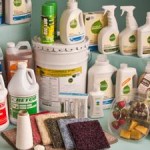 WASHINGTON, DC — The U.S. Department of Agriculture put its stamp on 60 products ranging from soap to carpet to engine oil in a bid to drive consumers to products made with biobased materials.
WASHINGTON, DC — The U.S. Department of Agriculture put its stamp on 60 products ranging from soap to carpet to engine oil in a bid to drive consumers to products made with biobased materials.
Through its Biopreferred program, the USDA has identified more than 5,000 biobased products in the past eight years for federal agencies to give purchasing preference to. In January this year it launched a certification program so companies can slap a label on products to show their biobased content.
The first round of labels went to goods from 11 companies, including cleaning and personal care items by Seventh Generation, NatureWorks’ corn-based clothing fibers and plastics, lubricants from Nutek, and food packaging from Clear Lam.
The label shows what percentage of a product and its packaging is made from renewable plant, forestry, animal (like chicken feathers) or marine (like algae) materials. It’s intended to both catch the eyes of consumers and also make it easier for federal purchasers to find bio-based goods.
“This is a label designed to increase the consumer market on these products,” said Ron Buckhalt, the Biopreferred program manager.
Seventh Generation, which earned the seal for 13 products, is working on how the seal will fit into its overall packaging design and use of environmental labels.
 “We have not yet decided how we’ll be communicating the certification to consumers,” said Dave Rapaport, senior director of corporate consciousness. “You don’t want it to look like NASCAR with all these logos on it.” Some seals that Seventh Generation’s goods can carry includes ones from the U.S. EPA’s Design for the Environment program, B Corporation, Forest Stewardship Council andGreenPalm.
“We have not yet decided how we’ll be communicating the certification to consumers,” said Dave Rapaport, senior director of corporate consciousness. “You don’t want it to look like NASCAR with all these logos on it.” Some seals that Seventh Generation’s goods can carry includes ones from the U.S. EPA’s Design for the Environment program, B Corporation, Forest Stewardship Council andGreenPalm.
“The fact that we pursued this says a lot,” Rapaport said. “We’ve been reluctant to pursue certification in the past.” What drew the company to the USDA’s certification was that it’s a third-party-verified account of how much biobased material is in a product — ASTM oversees the product evaluation, which uses carbon dating to measure content — and it puts that amount right on the label. “We think that it creates the kind of playing field on which we’d like to compete,” he said.
While Seventh Generation is mainly aimed at consumers, it’s a different situation for NatureWorks, since it sells corn-based plastic resin to companies that then make packaging, cups, plates, clothes and even things like diapers and phones. Adding the USDA certification makes the bio-based content clear for companies that want to make items with NatureWorks’ bioplastic. And it also shows that companies could potentially earn the certification label themselves, so long as they don’t add too much non-biobased content.
The BioPreferred program already has minimum biobased content levels for 50 types of products in order for them to be included in the program, and anything that doesn’t fit into those categories must be at least 25 percent biobased to be certified.
The USDA said 100 companies have submitted applications to carry the label on about 400 products in the last two months. Although the USDA could charge an application fee if Congress authorizes it, for now the process is free.






